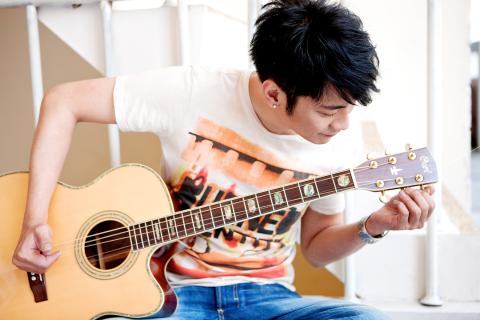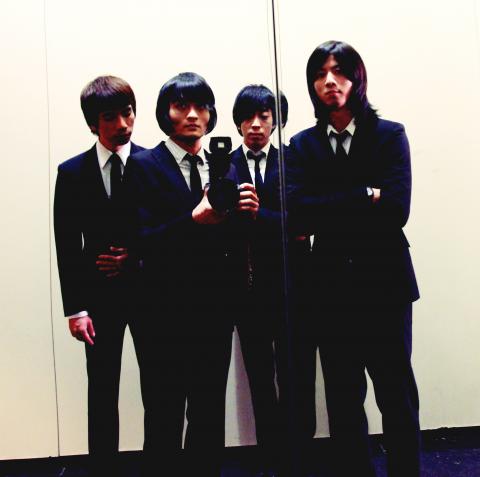Since 2007, Eslite Bookstore has held an annual live music event to pay tribute to the legendary Beatles’ rooftop concert in London shortly before the group disbanded.
The Rooftop Live! series, which runs from tonight through Sunday, has become a tradition of sorts for Taiwan’s most popular indie rock bands and their fans.
This year is no different, with headline sets from power-pop trio Mojo (Mojo樂團), which performs tonight, indie-pop veterans 1976 and singer-songwriter Dadado Huang (黃玠).

Photo courtesy of Eslite Bookstore
Those expecting the atmosphere of the Beatles’ historic live session on top of their headquarters on Savile Row will have to adjust their expectations.
Passersby are unlikely to even hear the music from the busy streets of Taipei’s East District (東區), the informal name of the area bounded by Fuxing South Road to the west, Civic Boulevard to the north, Songshan Road to the east and Xinyi Road to the south. The “rooftop” of Eslite’s event is a spacious outdoor terrace and garden on the seventh floor that holds around 1,000 people. The bands will play on a professional stage facing their audience, instead of standing near the edge of the building as the Beatles did.
Still, Rooftop Live! makes for a good party setting for live music fans. The space is a novel setting compared to the usual live music spots and offers a close-up view of nearby Taipei 101.

Photo courtesy of Eslite Bookstore
Tonight’s lineup promises an evening of straightforward, hard-hitting rock, with nu-metal group Monkey Pilot (猴子飛行員) opening for Mojo. There will also be a short appearance by veteran indie-folk musician and producer Ze Hwang (黃小楨).
Tomorrow, the hipsters are likely to be out in full force for Macbeth (馬克白), a post-punk/synth band whose sound nods to Joy Division and Arcade Fire. The group opens for indie-pop stalwarts 1976, who will play two sets of their Brit-rock influenced music. Rounding out the evening is an opening set from indie-folk band Hush!, as well as guest appearances by Tizzy Bac lead singer and pianist Chen Hui-ting (陳惠婷) and Loh Tsui Kweh Commune’s (濁水溪公社) zany bandleader Ko Ren-chien (柯仁堅), who is bound to raise some laughs.
Sunday is a more eclectic collection of performers, including We Save Strawberries (草莓救星), a group with a female vocalist that mixes indie-pop and post-rock, the highly regarded singer-songwriter Suming (舒米恩), whose work ranges from synth-pop to Aboriginal folk and rock, and rapper Soft Lipa (蛋堡). They open for Dadado Huang, a currently popular, squeaky-clean indie folk performer.

Photo courtesy of Eslite Bookstore
Snacks and beverages, including beer, will be on sale at the event. In the case of rain, bring an umbrella or plan on using one of the plastic disposable raincoats that the organizers will provide free of charge.
Schedule
Tonight
Monkey Pilot
Mojo
Tomorrow
Hush!
Macbeth
1976
Sunday
We Save Strawberries
Suming
Dadado Huang

That US assistance was a model for Taiwan’s spectacular development success was early recognized by policymakers and analysts. In a report to the US Congress for the fiscal year 1962, former President John F. Kennedy noted Taiwan’s “rapid economic growth,” was “producing a substantial net gain in living.” Kennedy had a stake in Taiwan’s achievements and the US’ official development assistance (ODA) in general: In September 1961, his entreaty to make the 1960s a “decade of development,” and an accompanying proposal for dedicated legislation to this end, had been formalized by congressional passage of the Foreign Assistance Act. Two

Despite the intense sunshine, we were hardly breaking a sweat as we cruised along the flat, dedicated bike lane, well protected from the heat by a canopy of trees. The electric assist on the bikes likely made a difference, too. Far removed from the bustle and noise of the Taichung traffic, we admired the serene rural scenery, making our way over rivers, alongside rice paddies and through pear orchards. Our route for the day covered two bike paths that connect in Fengyuan District (豐原) and are best done together. The Hou-Feng Bike Path (后豐鐵馬道) runs southward from Houli District (后里) while the

March 31 to April 6 On May 13, 1950, National Taiwan University Hospital otolaryngologist Su You-peng (蘇友鵬) was summoned to the director’s office. He thought someone had complained about him practicing the violin at night, but when he entered the room, he knew something was terribly wrong. He saw several burly men who appeared to be government secret agents, and three other resident doctors: internist Hsu Chiang (許強), dermatologist Hu Pao-chen (胡寶珍) and ophthalmologist Hu Hsin-lin (胡鑫麟). They were handcuffed, herded onto two jeeps and taken to the Secrecy Bureau (保密局) for questioning. Su was still in his doctor’s robes at

Mirror mirror on the wall, what’s the fairest Disney live-action remake of them all? Wait, mirror. Hold on a second. Maybe choosing from the likes of Alice in Wonderland (2010), Mulan (2020) and The Lion King (2019) isn’t such a good idea. Mirror, on second thought, what’s on Netflix? Even the most devoted fans would have to acknowledge that these have not been the most illustrious illustrations of Disney magic. At their best (Pete’s Dragon? Cinderella?) they breathe life into old classics that could use a little updating. At their worst, well, blue Will Smith. Given the rapacious rate of remakes in modern